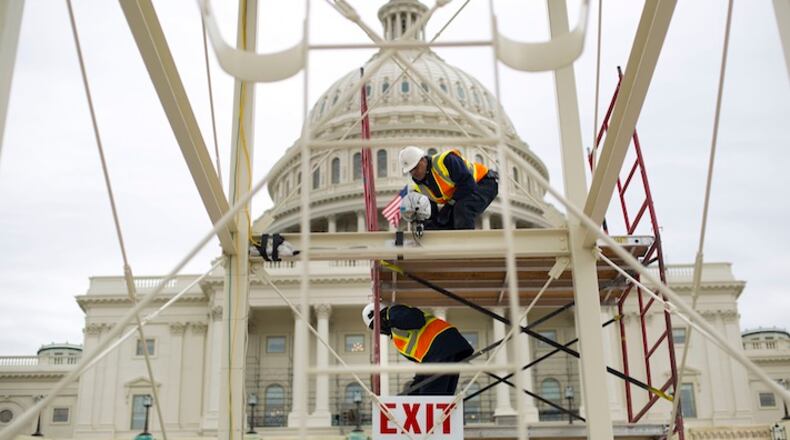The day after Donald Trump is inaugurated as president, an estimated 200,000 people from across the country will flood Washington for a demonstration billed as the Women's March on Washington.
Some will stand up for what are traditionally labeled women's issues, such as equal pay and paid family leave. Many say they will be marching just to feel heard, and to express their fear that a range of liberal causes could be endangered under the Trump administration.
But many organizers say the march is not just an anti-Trump protest. It's as much a rallying cry for all those people and issues on the other side as it against him, they say.
"We don't consider this a protest. It's a positive movement," said Elizabeth O'Gorek, who co-chairs the local logistics committee in Washington. "All of these causes — environmental concerns, immigration, Black Lives Matter — those are all women's issues."
Margie Storch said she was alarmed at the rhetoric Trump used on the campaign trail and some of the policies he proposed. But the longtime civil rights activist said she wasn't making the 7-hour bus ride from Charlotte, North Carolina, to Washington to protest him.
"Donald Trump is our president," she said. "I feel like we need to continue to communicate with him and our representatives in Congress and just let them know what we want. I want to show up and speak out for women's rights, human rights, civil rights, health care rights — all the things that I believe in."
To organizers, it's a lot about believing.
"I haven't felt hope since the election, and I'm feeling like I have my voice back now," said Emma Collum, a lawyer from Fort Lauderdale, Fla who said she woke up Nov. 9 "feeling a sense of loss."
"I needed to take some kind of movement forward instead of wallowing in depression," she said.
When she came across a small group of women who planned to march in Washington as she scrolled through Facebook, she contacted them offering her legal services.
Two months later, she is the lead organizer for 20,000 people from Florida who are coming to Washington "on planes, trains and automobiles." She knows of at least 50 chartered buses that are making the 12- to 16-hour trip from her state.
"It's not a pleasure cruise, but these women are so activated and so excited," Collum said. "Even my stepfather is coming with us, because he says he regrets that he didn't march against Vietnam."
The event's policy platform covers a broad range of issues, including racial profiling, the environment, abortion and LGBT rights. Its website lists 177 partners including Planned Parenthood, the Human Rights Campaign, the NAACP and Voto Latino.
It's called the women's march because it is being led by women, not because it's limited to certain issues. said Hayne Beattie-Gray, of Charleston, S.C. After the election, she said, her 12-year-old daughter asked her tearfully, "Does Donald Trump believe in climate change yet?"
As soon as Beattie-Gray heard about the demonstration she booked tickets for them both, and became the lead organizer for her state. More than 3,000 South Carolinians are headed to Washington, many on 23 chartered buses from different cities.
While her daughter will march for climate issues, Beattie-Gray said she had focused on racial justice.
It was a shock to realize that "Caucasian women had voted Trump into office," she said. When she started organizing the South Carolina group, she decided they had to break out of the "conversation bubbles."
"I went out and reached out to women of color who were bad-asses," she said, talking about bringing together women who were leaders in their communities. "I intentionally built the South Carolina team diverse, because I did not want to give up one mission for another. All these issues are women's issues."
Trump's election was a wake-up call for many women like herself, Beattie-Gray said.
"We thought, 'OK, we have our first black president,' and maybe we were lulled into a bit of a complacency," she said. "Maybe we were feeling that we had evolved beyond a post-racial world, a world of gender equality."
Organizers hope the momentum will keep going after Jan. 21.
Democratic groups hope to harness that energy. EMILY's List, the largest women's organization in Democratic politics, plans the day after the march to train 500 women interested in running for office.
The South Carolina group has already planned "March On" meetings to keep women engaged after they return from Washington.
"I'm excited for the energy of the 21st, but I'm really excited about what's happening in South Carolina when this wraps up," Beattie-Gray said. "This election has woken up a lot of women. It's like a re-emergence of feminism, getting people engaged in their communities, getting women running for office."
About the Author
Keep Reading
The Latest
Featured



